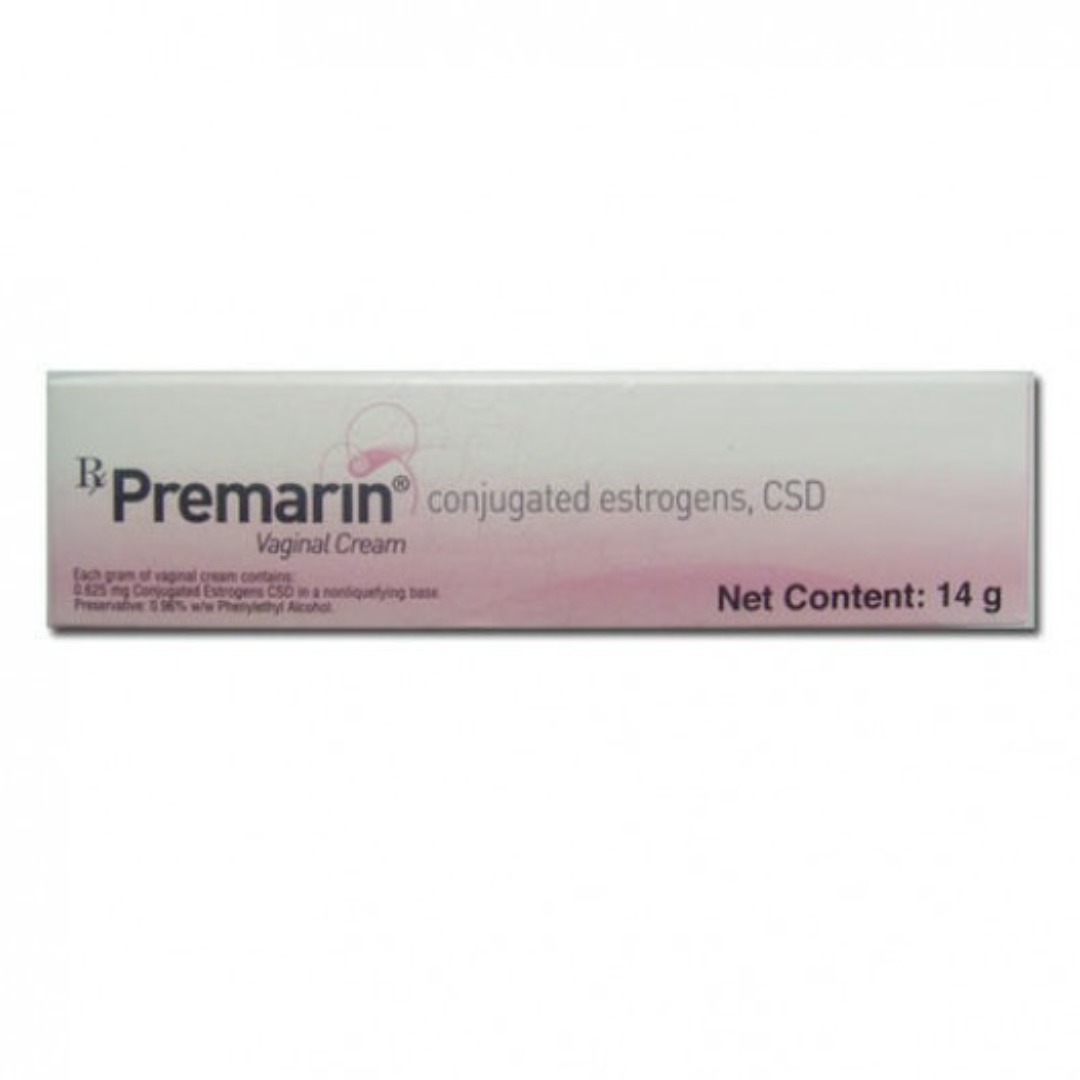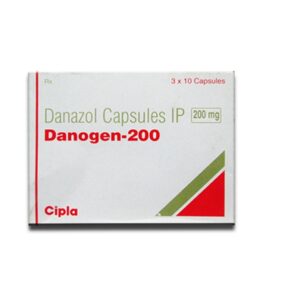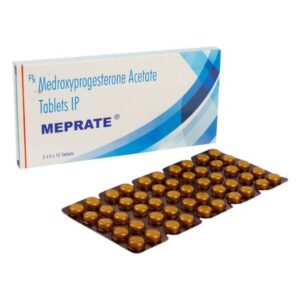Premarin Vaginal Cream 14 gram
Premarin Vaginal Cream 14 gm is a ‘hormone replacement treatment’ cream that is used to treat the symptoms and conditions of menopause. Estrogen levels drop during menopause, resulting in hot flushes (feeling of heat over the face, neck, and chest). Osteoporosis is a disease that affects women after menopause (thinning of bones). After menopause, Premarin Vaginal Cream 14 gm can be used to prevent osteoporosis.
Premarin Vaginal Cream 14 gm is a hormone replacement cream that contains ‘conjugated estrogens’ (HRT). In menopausal women, it acts by replenishing the estrogen hormone. It also controls the secretion of hormones including luteinizing hormone (LH) and follicle-stimulating hormone (FSH), which are important for sexual function and the menstrual cycle (regulates menstrual cycle). These effects aid in the alleviation of menopausal symptoms.
Premarin Vaginal Cream 14 gm is offered as a pill, an injection, or a cream. It’s great if you followed your doctor’s instructions and used Premarin Vaginal Cream 14 gm. Abnormal vaginal bleeding or spotting, vaginal discharge, breast pain and swelling, discharge from the nipples, changes in breast tissue, feeling or being sick, bloating, abdominal pain, headache, dizziness, mood changes, irritability, joint pain, leg cramps, increased or decreased libido (sexual desire), swelling of the face or ankles, skin rashes, changes in hair growth, eye, weight, and triglyceride levels are all common (yellowing of the skin or eyes).
If you are allergic to ‘conjugated estrogens’ or any of the substances in Premarin Vaginal Cream 14 gm, do not use it. Premarin Vaginal Cream 14 gm should not be used if you have a history of breast cancer, endometrial cancer (womb lining cancer), unexplained vaginal bleeding, untreated endometrial hyperplasia (womb lining thickening), a blood clot in the veins (thrombosis), in the legs (deep vein thrombosis), or in the lungs (pulmonary embolism), a blood clotting disorder, It is not advised for use by women who are pregnant or breastfeeding. If you develop jaundice (yellowing of the skin and eyes), high blood pressure, or migraine-like headaches, become pregnant, or notice signs of a blood clot such as redness, swelling, and pain in the legs, sudden chest pain, or difficulty breathing, stop using Premarin Vaginal Cream 14 gm and consult your doctor right away. If you have a sugar sensitivity, tell your doctor.
Hormone replacement therapy with Premarin Vaginal Cream 14 gram

Medicinal Advantages
Premarin Vaginal Cream 14 gm is a hormone replacement medication that contains ‘conjugated estrogens’ (HRT). Because estrogen levels drop throughout menopause, Premarin Vaginal Cream 14 gm acts to replace it. It also controls the secretions of other pituitary hormones including luteinizing hormone (LH) and follicle-stimulating hormone (FSH), which are important for sexual function and the menstrual cycle (regulates menstrual cycle). These effects aid in the alleviation of menopausal symptoms.
Use Instructions
Premarin Vaginal Cream 14 gm comes as a pill, a topical cream, and an injection. The dose and duration of the medicine are determined by the doctor. With a glass of water, swallow the tablet whole. It should not be crushed, chewed, or broken. For best effects, take the drug at the same time every day. A syringe is used to provide Premarin Vaginal Cream 14 gm injection. Do not self-administer because it is administered by a healthcare expert. Cream for the skin: The injured region should be cleaned and dried. Apply a thin layer of medication to the affected area after that. Do not apply to open wounds or broken skin. Hands should be washed before and after use.
Store in a cool, dry location away from direct sunlight.
Premarin Vaginal Cream 14 gm Side Effects
The following are some of the most common negative effects:
Nausea, gas, and stomach discomfort
Backache, headache
Depression and sleep disturbances (insomnia)
Breast discomfort
Changes in your regular periods, vaginal irritation or discharge, and breakthrough bleeding are all signs of a problem.
The following are serious but uncommon adverse effects:
Lumps in the breasts
Vaginal bleeding that is unusual
Vision or speech changes
New terrible headaches appear out of nowhere.
Severe chest or leg aches, with or without shortness of breath, weakness, and exhaustion
Lips, tongue, or face swelling
Drug Recommendations
If you have fibroids inside the womb, endometriosis (womb lining growth outside the womb), endometrial hyperplasia (excessive thickening of the womb lining), high blood pressure, diseases of the liver, kidneys, or heart, fluid retention (oedema), diabetes, or gallbladder disease, tell your doctor before taking Conjugated Estrogens. Because conjugated estrogens raise the risk of endometrial hyperplasia and cancer, your doctor may prescribe the hormone ‘progesterone’ to lower your risk. Yellow-colored tablets include a coloring ingredient that may cause allergic responses. Because this drug includes lactose, tell your doctor if you have a sugar intolerance. If you are pregnant or breastfeeding, tell your doctor.
Interactions Between Drugs
Interactions between drugs: Anticonvulsants (phenobarbital, phenytoin, and carbamazepine), tuberculosis medicines (rifampicin and rifabutin), HIV medicines (nevirapine, efavirenz, ritonavir, and nelfinavir), antibiotics (erythromycin and clarithromycin), antifungal medicines (ketoconazole and itraconazole), herbal preparations like St. John’ (dexamethasone).
Avoid grapefruit or grapefruit juice while taking this prescription since it increases the chance of negative effects.
Conjugated Estrogens are contraindicated in the following conditions: breast cancer, endometrial cancer (cancer of the womb lining), unexplained vaginal bleeding, untreated endometrial hyperplasia (thickening of the womb lining), have a blood clot in the veins (thrombosis), in the legs (deep vein thrombosis), or the lungs (pulmonary embolism), blood clotting
Safety Suggestions
ALCOHOL
Alcohol consumption may aggravate the disease by raising the chance of negative effects.
PREGNANCY
Conjugated Estrogens is a medication in the category X. This medication should not be used by pregnant women since it causes fetal problems.
BREAST FEEDING
Because conjugated estrogens can transfer into breast milk, they are not recommended for breastfeeding women.
DRIVING
Conjugated Estrogens may not impair your driving ability.
LIVER
In patients with liver problems, conjugated estrogens should be avoided.
KIDNEY
In patients with severe kidney disease, conjugated estrogens should be taken with caution. It’s possible that you’ll need to modify your dosage.
No habit formation
Advice on Diet and Lifestyle
Wear loose, layered clothing at night, especially if the weather is warm. Hot flushes are avoided as a result of this.
Maintain a healthy weight. If you are obese or overweight, lose weight by exercising consistently.
If you’re feeling down, unhappy, or alone, or if you’re having trouble sleeping, see a psychologist.
To avoid skin dryness, use moisturizers.
Reduce your alcohol consumption and quit smoking.
Recommendations
Inform your doctor if you are taking Conjugated Estrogens before taking any blood tests, as this medication may influence the findings of some tests.
To promote bone health and lower the risk of osteoporosis, take calcium and vitamin D supplements.
Additional Information: This item is non-refundable.
Concerns of Patients
Menopause happens when a woman is between the ages of 45 and 55 and hasn’t had a period in at least 12 months. However, some women may reach menopause before the age of 45 or after the age of 55. It arises as a result of a decrease in estrogen hormone production. During menopause, the levels of other hormones such as progesterone, luteinizing hormone, and follicle-stimulating hormone change. Hot flushes, vaginal dryness, insomnia (sleeplessness), weight gain, decreased sexual desire, sore breasts, hair loss, unwanted hair growth, headaches, and urinary tract infections are only few of the symptoms.
FAQs
Conjugated Estrogens operate by restoring the estrogen hormone that has been depleted in menopausal women. It efficiently alleviates symptoms and promotes overall health.
Conjugated Estrogens have no contraceptive properties. If you haven’t had a period in less than a year or are under 50 years old, you may need an extra contraception to avoid pregnancy. As a result, get guidance from your physician.
Conjugated Estrogens dosage is determined by your doctor based on your medical condition.
Conjugated Estrogens might make you gain or lose weight. Conjugated Estrogens is a supplement that contains ‘conjugated estrogen,’ which is a hormone that affects metabolism and body weight. Exercise often and consume a well-balanced diet, however, to maintain a healthy weight. Consult your doctor if you notice an unexpected weight increase.
Breast cancer risk is increased by conjugated estrogens. However, the danger rises when HRT (hormone replacement treatment) is used alone and for extended periods of time.







Leave a Reply
You must be logged in to post a comment.